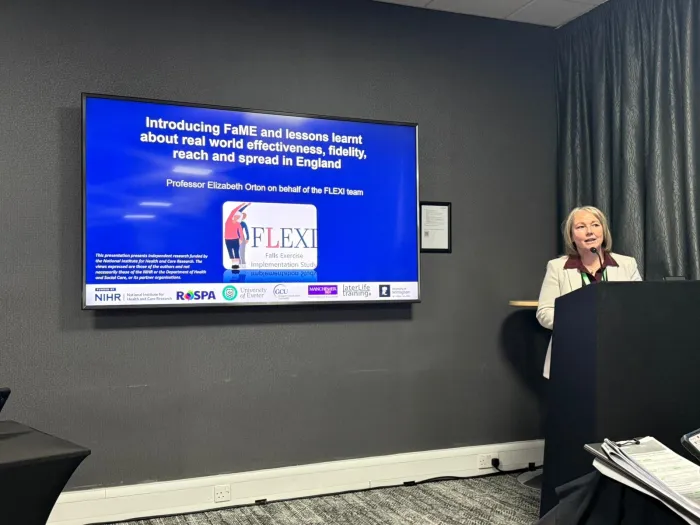
This event takes place annually to cover core areas of interest to all specialists responsible for the healthcare of older people. This year, it took place at the East Midlands Conference Centre and online to showcase the latest scientific research and best clinical practice in the care of older people.
At the BGS Autumn Meeting, Professor Elizabeth Orton, from the University of Nottingham, led a symposium on falls prevention programmes and presented the new Falls Management Exercise Programme (FaME) Implementation Toolkit — an evidence-based, practical guide aimed at improving delivery of community exercise programmes that can reduce falls by up to 30 per cent.
The ageing population is stimulating extensive NHS service redesign to deal with the challenge of caring for larger numbers of older people both in and out of hospitals with falls remaining a major public health concern.
One in three people over 65 and one in two over 80 experience at least one fall each year, the leading cause of emergency hospital admissions among older adults, contributing to over four million hospital bed days annually in England.
Available on a new dedicated online platform, hosted and maintained by Later Life Training, the FaME Implementation Toolkit is freely accessible to providers, commissioners and practitioners.
It offers step-by-step resources for implementing the six-month, group-based exercise programme, which focuses on enhancing strength, balance and confidence in adults aged 65 and over. It is part of a broader mission to equip local areas with the tools to tackle falls in older populations
Professor Orton said: “The FaME programme is not only effective at reducing falls and improving physical function, but older adults genuinely enjoy it.
“Our new toolkit shows how FaME can be delivered in real-world community settings, and we hope it will encourage wider adoption across health and social care systems.”
The toolkit is a collaboration between the National Institute for Health and Care Research (NIHR) Applied Research Collaboration (ARC) East Midlands, NIHR ARC Wessex, NIHR PenARC and NIHR ARC GM, Health Innovation South West, and the Universities of Nottingham, Manchester, Exeter and Glasgow Caledonian, the Royal Society for the Prevention of Accidents and Later Life Training.
Later Life Training has been training Postural Stability Instructors, who deliver the FaME programme across the UK and Ireland, since 2003 and has supported the specialist instructors, service managers and the commissioners to deliver the programme effectively to enable older people to ‘get up, stay up and live their best lives’.
Professor Kamlesh Khunti, Director of the NIHR ARC East Midlands, added: “The impact of falls on older people can be devastating. With the new FaME toolkit, we now have the practical guidance needed to deliver proven interventions at scale, helping people remain active, confident and independent.”
NIHR ARC East Midlands funds vital work to tackle the region’s health and care priorities by speeding up the adoption of research onto the frontline of health and social care. The organisation puts in place evidence-based innovations which seek to drive up standards of care and save time and money.
NIHR ARC East Midlands is hosted by Nottinghamshire Healthcare NHS Foundation Trust and works in collaboration with the Health Innovation East Midlands. It has bases at the University of Leicester and the University of Nottingham.
Later Life Training is a not-for-profit organisation that delivers education, training and programmes that focus on best practice for professionals and improvement outcomes for older people.
Its mission is to empower professionals to approach movement and exercise differently, looking beyond stereotypes to reduce falls and frailty, and thus improve quality of later life.
The FaME Implementation Toolkit is now available online. To access the Toolkit and for more information, visit here.
